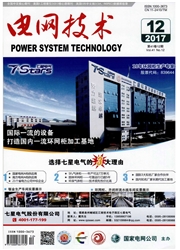

 中文摘要:
中文摘要:
随着光伏发电的快速发展,完善光伏并网技术要求保障并网光伏安全稳定运行越显重要。光伏防孤岛保护是光伏发电系统必备的保护功能,国内外光伏标准在孤岛保护方面有差别,国内的防孤岛检测标准尚不完善。在光伏孤岛理论基础上推导了2种孤岛检测算法的盲区,通过分析不同的光伏孤岛检测标准和检测盲区关系,得出了频率和电压的保护阈值。负载品质因数以及孤岛检测算法的参数设置会影响光伏防孤岛保护试验,并采用仿真算例验证了以上因素对孤岛试验结果的影响。最后用一个实测的孤岛试验案例说明了标准差异的结果和孤岛检测的必要性,从而为光伏防孤岛保护试验和标准完善提供参考。
 英文摘要:
英文摘要:
With the rapid development of photovoltaic (PV) power generation, it becomes more and more important to perfect the grid-connection technology of distributed PV generations and to ensure the secure and stable operation of grid-connected PV generations. The anti-islanding protection of islanded PV generation is a necessary protection function of PV generation system, and there are differences between the anti-islanding protection standard in China and those in the other countries, and the anti-islanding detection standard in China is yet imperfect. Based on theoretical basis of islanded PV generation, the non-detected zones of two islanding detection algorithms are derived, and by means of analyzing the relations between different islanding detection standards for distributed PV generation and corresponding non-detection zones the protective thresholds of frequency and voltage are obtained. The loaded quality factor and the parameter setting of islanding detection algorithm will influence the anti-islanding protection test for PV generation and the impacts of above-mentioned factors on the results of the islanding test are validated by simulation cases. Finally, the difference between domestic anti-islanding detection standard and the anti-islanding detection standards in the other countries as well as the necessity of carrying out islanding detection are illustrated by the measured results of an islanded test case.
 同期刊论文项目
同期刊论文项目
 同项目期刊论文
同项目期刊论文
 期刊信息
期刊信息
